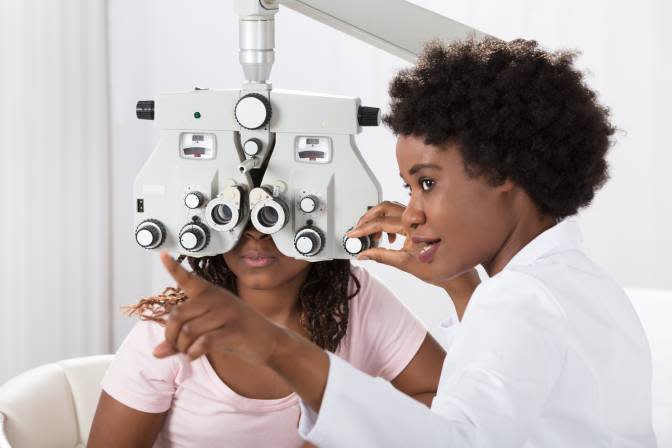Buy one pair of eyeglasses, get a second pair free!
*Restrictions apply. Click here for details.
Comprehensive Eye Exams for Eye Health

Nationwide Vision: Comprehensive Eye Exams
The highly qualified licensed optometrists of Nationwide Optometry provide comprehensive eye exams as part of their eye care services. Our doctors recommend annual eye exams to ensure the health of your eyes and the clarity of your vision. Our doctors can help you find the right prescription for your eyeglasses and/or contacts and ensure your eyes are healthy.
What is a Comprehensive Eye Exam?
Nationwide Vision's skilled Arizona eye doctors will perform comprehensive eye exams and evaluate your visual acuity and the complete health of your eyes. Comprehensive eye exams are not like regular eye exams, they can help detect eye diseases and illnesses (glaucoma and cataracts) and protect the health of your eyes. Eye exams can also help detect early signs of other health problems like diabetes and high blood pressure, based on blood vessels and other structures in the eye. A comprehensive eye exam is recommended annually.
What to Expect During an Eye Exam
An eye exam normally takes about an hour and half for the doctors to screen your eyes. At the start of an eye exam, your eye doctor will ask if you have been experiencing any vision problems. If you wear glasses or contacts, you should bring them with you so your doctor can assess your current prescription.
Nationwide Vision's Arizona eye doctors will perform a number of tests during your eye exam to check your vision, determine your prescription, and evaluate the health of your eyes. Use Nationwide Vision's Virtual Try-On to pick out your new pair of frames so you're all set when you visit the office!
The Experienced Arizona Eye Exam Doctors at Nationwide Vision
Comprehensive eye exams are an important part of health care, allowing the experienced Arizona optometrists of Nationwide Vision to detect more serious issues before they cause additional vision problems. To help diagnose and treat any potential eye conditions, schedule an eye exam appointment with Nationwide Vision.

Request an Eye Exam Today!
Nationwide Vision has multiple locations servicing Arizona. Click to request your eye exam today.
Frequently Asked Questions about Eye Exam Tests
It normally takes about an hour and half for the doctors to screen your eyes.
A referral is not necessary, but Nationwide Vision recommends that a patient request a referral from a primary care physician or optometrist before scheduling an eye exam related to a specific health condition. A referral ensures that a patient is seen by the appropriate specialist for his or her condition.
Tests and procedures may affect a patient with temporary headaches or vision changes, but comprehensive eye exams do not cause damage to the eyes.
